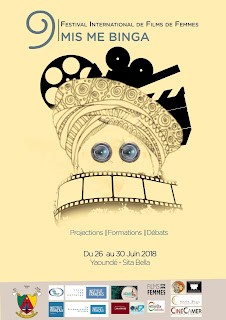FestIC 2018
Festival des Identités Culturelles
(Festival of Cultural Identities)
Ouagadougou, Burkina Faso
1ère | lst Edition
Le Cinéma Numérique Ambulant Afrique
CNA crée le Festival des Identités Culturelles, en abrégé FestIC. La première édition de cet évènement se tiendra à Ouagadougou, Burkina Faso, du 4 au 10 novembre 2018 sous le thème : « Identités culturelles en milieu urbain »
.
Ce festival a pour but de promouvoir les films qui font découvrir des identités culturelles particulières. Il s’inspire de l’expérience de la pratique du Cinéma Numérique Ambulant en tant que structure de diffusion des cinémas d’Afrique en milieu rural africain.
CNA The Mobile Digital Cinema Africa launches the Festival of Cultural Identities, abbreviated FestIC. The first edition of this event will be held in Ouagadougou, Burkina Faso, from 4 to 10 November 2018 under the theme: "Cultural Identities in an Urban Environment".
This festival aims to promote films that highlight specific cultural identities. It draws on the experience of the practice of CNA The Mobile Digital Cinema as a exhibition/distribution structure for African cinemas in rural Africa.
Les objectifs
- Accroître le niveau de connaissance des populations sur les valeurs et expressions culturelles des communautés minoritaires,
- Promouvoir le dialogue interculturel entre les communautés,
- Promouvoir l’oralité et les arts oratoires des communautés par l’image,
- Distraire et donner à voir des films africains de qualité au grand public.
Le CNA permet aux populations rurales de découvrir la culture d’autres communautés à travers le cinéma. C’est donc un juste retour que de permettre à un public citadin de découvrir des communautés avec leurs richesses culturelles et artistiques qui, pour certaines, sont en train de disparaitre, phagocytées par l’effet de la mondialisation et de la civilisation de l’universel.
En révélant au public des cultures de sociétés différentes à travers les films diffusés, le CNA participe au rapprochement des communautés et suscite chez les gens l’envie de témoigner de leurs propres valeurs culturelles.
Goals
- Increase people's knowledge of the cultural values and expressions of minority communities,
- Promote intercultural dialogue between communities,
- Promote the orality and the oratory arts of communities through the image,
- Entertain and show quality African films to the general public.
The CNA enables rural populations to discover the culture of other communities through film. It is therefore a rightful giving-back to enable urban dwellers to discover communities with their cultural and artistic riches, some of which are disappearing, overtaken by the effect of globalization and the world society.
By presenting to the public the cultures of different societies through the films presented, CNA participates in bringing communities together and inspires people to show their own cultural values.
DOCUMENTAIRE | DOCUMENTARY
Okuta, la pierre by/d’Ayéman Aymar Esse, 52’, Bénin, 2015
Douvan jou ka leve (Le jour se lèvera) by/de Gessica Geneus, 52’, Haïti, France, 2017
Iya Tunde, la mère est revenue by/de Laure Malecot, 52’, Sénégal, 2016
Mada underground by/de Denis Sneguirev et Philippe Chevallier, 55’, Madagascar, 2016
Le langage des perles by/d’Arsène Pandi, 12’, Togo, 2017
Gade ! by/de Hermane Desorme, 57’, Haiti, 2017
Les gracieuses by/de Fatima Sissani, 79’, France, 2014
Le rythme à la canne : un héritage royal by/de Natacha Hounvo, 26’, Bénin, 2017
Talaatay Nder (Le mardi de Nder) by/de Chantal Durpoix, 20’, Sénégal, Brésil, 2016
Under the bell by/de Bart Lambert Oubda, 9’, Burkina Faso, 2015
La promesse du biram by/d’Allamine Kader, 68’, Tchad, 2016
Dance for change by/de Cécile Thery, 63’, Burkina Faso, 2017
Au fantôme du père by/de Marie Laurentine Bayala, 52’, Burkina Faso, 2017
Poissons d'or, poissons africains by/de Thomas Grant et Moussa Diop, 52’, Sénégal, 2018
FICTION
Le Jardin d’essai by/de Dania Reymond, 43’, Algérie, 2016
N’Zueba by/d’Ursula Koffi, 15’, Côte d’Ivoire, 2018
Toi et moi by/de Steve Kamdeu, 13’, Cameroun, 2017
Héritage by/de Fatoumata Tioye Coulibaly, 15’, Mali, 2017
Tikitat-A-Soulima by/d’Ayoub Layoussifi, 29’, Maroc/France, 2016
Ngouhtepong by/de Vincent Foudoudji, 85’Cameroun, 2017
































